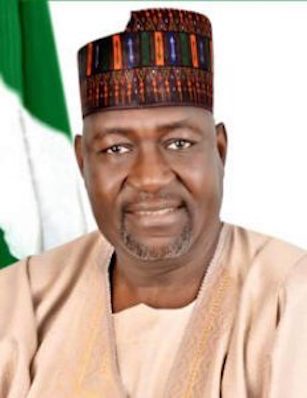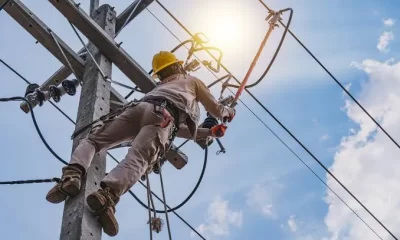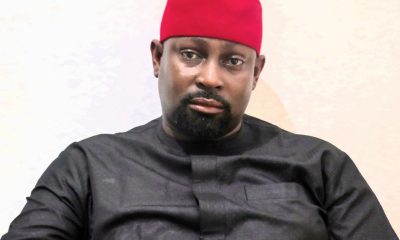Energy and Power
Buhari to Bequeath 22,000 Megawatts Generating Capacity of Electricity by 2023–Minister

The Minister of Power, Abubakar Aliyu says that the President Muhammadu Buhari led administration will bequeath about 22,000 megawatts installed capacity of electricity by 2023.
He said this at the Presidential Score Card of the Ministry of Power in Abuja.
The programme is an annual event where the various ministries present their achievements to the media and the general public.
Aliyu said the adminstration had embarked on several transformational projects to bequeath an additional 4,000 megawatts generating capacity to existing megawatts.
He said as part of the plans to achieve the 4,000 additional megawatts, the 700 megawatts Zungeru Hydro Power Plant would be completed in the first quarter of 2023.
Aliyu said the administration would work toward operationalisation of the 240 megawatts Afam III and 300 megawatts Okpai Phase II among others.
“We will set the country on a stable path for 10,000 megawatts of supplied energy.
“Today we are at 8,000 megawatts with 5,000 megawatts on-grid and above 3,000 mega watts of industrial captive off-grid and we will leave an installed capacity of almost 22,000 megawatts,” he said.
According to the minister, there are ongoing programames with facilities and investments secured at more than three billion dollars to eliminate the gap between transmission capacity and supplied energy.
“The Hydropower component of the Kashimbilla Multipurpose Dam was designed and upgraded from six megawatts to 40 megawatts.
“This was in phase one of the evacuation infrastructure, covering 245km of 132kv transmission lines and three substations, connecting Takum, Wukari, Rafin Kada, Dounga and Yandev in Taraba and Benue States.
“The Phase two of the evacuation infrastructure is currently at 45 per cent completion level.
“This is covering 56km extension of the 132 kilovolt (kV) transmission line from Yandev to Makurdi and complete rehabilitation of the Yandev substation.
“Phase two of the evacuation infrastructure will lead to the electrification of 24 host communities, including Zaki-Biam, Anyi, Buruku, Birama, Bibi, Shibong, among others within Benue State,” he said.
Aliyu said his administration had changed the narrative of the sector from consumption spending on subsidies to real infrastructure spending.
He said a total of 105 Power Transformer projects were completed during the period 2015 to 2022, with a capacity of 6,216 Mega Volt Ampere ( MVA) to the grid.
“This is with 73 of the power transformers installed by TCN engineers in substations across the nation.”
Aliyu said “some of the completed Power Transformer and Substation projects are 150 MVA, 330 and 132 kilovolt (kV) Interbus Power Transformer at Ughelli, Delta IV Transmission Substation”.
“Also, there are 150MVA, 330 and 132kV Power Transformer at Ayade Transmission Substation, 2x150MVA 330 and 132 and 33kV Substation at Lafia, Nasarawa State.
“There is also the 2x60MVA 132 and 33kV Dawaki/Gwarinpa Substation which was recently completed in November 2022 under the Abuja Feeding Scheme.
“Others are 2x60MVA 132 and 33kV Gagarawa Substation, 2x60MVA 132 and 33kV Substation at Adiabor, 2x30MVA 132 and 33kV Yelwa Yauri, 1x30MVA 132 and 33kV Ilashe Substation, 1x40MVA 132 and 33kV Substation at Bichi.”
The minister also said that a number of substations and bay extensions were being completed and expected to be inaugurated by quarters one and two of 2023.
The substations according to him are, 2x150MVA, 330/132/33kV and 2x60MVA 132/33kV Substation in Akure, 2x150MVA 330/132/33kV Substation at New Apo, under the Abuja Feeding Scheme among others.
While still listing the giant strides of the current administration, the minister said about 900km of reconductoring and construction of new transmission lines was completed during the period between 2015 and 2022.
He also said some transmission line projects were almost completed and expected to be commissioned by quarters one and two of 2023.
Some of the line projects according to the minister are the “Kaduna-Jos Double Circuit Transmission Line and the Benin – Ajaokuta 330kV Single Circuit Turn In Turn Out on Azura Ihovbor Transmission Line.”
Aliyu further said there were other critical ongoing projects under the Nigeria Electricity Grid Maintenance, Expansion & Rehabilitation Programme.
He said the projects were being financed by the multilateral agencies like World Bank, Africa Development Bank (AfDB) among others and valued at about two billion dollars.
He also said a review of the Nigerian Electricity Supply Industry (NESI) showed that it had done better than what it inherited from previous administrations.
“In 2021, the Quarter two record growth rate of five per cent by the Nigerian Economy, as recorded by the Nigerian Bureau of Statistics (NBS) had a large contribution from the power sector with a 78 per cent Year-on-Year growth.
“In the first half of 2022, the NESI recorded its highest revenue in eight years at N393 billion.
“In the recent October billing cycle, the sector recorded a new milestone with the highest ever collections in history at N74 billion,”he said.
The minister said the ministry was not unmindful of the lower income citizens, who did not always receive adequate electricity.
He said the ministry would continue to protect lower income earners by maintaining subsidies for lower tariff bands while allowing those with adequate power to pay relatively higher prices.
According to him, tariff shortfalls had been reduced by more than 80 per cent, while the ministry is on the path to having sustainable market that can pay for itself. (NAN)
Business News
Edun Seeks Liquidity for Power Sector as NDPHC Declares Calabar Best Power Plant

By Eze Okechukwu, Abuja
The Minister of Finance and Coordinating Minister for the Economy, Wale Edun yesterday declared that liquidity was the major hindrance required by the troubled power sector to achieve the desired result of producing steady Power in Nigeria.
This is as the Managing Director of Niger Delta Power Holding Company (NDPHC) Chiedu Ugbo informed the Senate Committee on Power in Abuja yesterday that the Calabar Power Generation Company under its ownership was the best performing power plant in the country.
In his submission to the Committee investigating the controversial Make up Gas (MUG) Reprocessing Deal Involving the Ministry of Finance, NDPHC, Calabar Generation Company Limited and ACUGAS Limited, the Minister of Finance pointed out that the need for liquidity into the Power Sector remained the key to unlocking it.
The Minister who made the submission through his Special Assistant, Mallam Dahiru Moyi said the agreements on Gas supply between NPDHC and ACUGAS Limited was inherited by former President Muhammadu Buhari in 2015, following after the agreement was signed in 2011 during President Goodluck Jonathan’s administration.
According to him, “just as the Ministry of Justice was not aware of the contract agreement, the Ministry of Finance was also not part of it from the beginning but since government is a continuum, the Ministry of Finance later came into it for the purpose of facilitating the required liquidity.
“The issues on ground about contracts agreements being investigated by the Senate Committee on Power is not about restructuring but providing the required liquidity which the Ministry of Finance is doing through collaboration with the Nigerian Liquified Natural Gas (NLNG).
“Since NLNG pays Gas in Dollars, the Ministry is collaborating with it for a practical solution of bringing liquidity into the age long contract agreement through Deed of Transfer.
“Make Up Gas (MUG) belongs to Calabar, Calabar belongs to NDPHC and NDPHC belongs to Federal and State governments with the Federal Government having 52.68%”, he said.
In his own submission before the Committee, the Managing Director of NDPHC, Chiedu Ugbo said the company as a result of the Gas supply agreement with ACUGAS Limited was taking Gas from three out of five units and generating power from Calabar plant to the National Grid which according to him was the best power plant in the entire country.
He said NDPHC went out of its way to construct an 80 kilometres gas pipeline for utilization of MUG in Calabar and Alaoji power plants.
He however lamented that problems relating to systemic transition, frequency and voltage issues have not made the firm achieve the desired results.
In his remarks, the Chairman of the Committee, Senator Enyinnaya Abaribe (APGA, Abia South) thanked the stakeholders for giving the Committee clarity on the issue but added that it was still an ongoing investigation.
Energy and Power
Oil, Electricity Workers’ Unions Mobilise for Planned Strike

The Nigeria Union of Petroleum and Natural Gas Workers (NUPENG) has directed its members to comply with the directive of the two labour centres to begin an indefinite nationwide strike on Monday.
Its General Secretary, Mr Afolabi Olawale, in a statement on Saturday, said the union was committed to ensuring total compliance with the directive.
Recall that the Nigeria Labour Congress (NLC) and Trade Union Congress of Nigeria (TUC) declared an indefinite nationwide strike to begin on Monday, to express their grievances over the proposed new minimum wage.
.In a joint statement signed by NLC President, Mr Joe Ajaero and TUC President, Mr Festus Osifo, the centres declared the strike over the tripartite committee’s inability to agree on a new minimum wage and the hike in electricity tariff.
Afolabi said the union was concerned and disturbed with the insensitive attitude of the federal government “to the very critical issue of negotiating a new minimum wage for Nigerian workers”.
“This is in view of the various socio- economic policies of this administration that have impoverished the working people of this country.
“Leaders of our great union at all levels, from the units, zones and branches, should immediately put all processes in place to ensure total compliance with this directive.”
Also, the National Union of Electricity Employees (NUEE) said it was mobilising its members to embark on the strike following the directive of NLC and TUC.
The Acting. General Secretary, Mr Dominic Igwebike, gave the directive to the members in a statement.
Igwebike said that along with the reasons of inconclusive negotiations on the minimum wage and electricity tariff hike, apartheid categorisation of Nigeria electricity consumers into bands was another, to embark on the strike.
“Given the above, all national, state, and chapter executives are requested to start the mobilisation of our members in total compliance with this directive to ensure the government does the right thing as stated above.
“The withdrawal of services becomes effective on Sunday 2nd June by 12.00 midnight, “ the union leader said. (NAN)
Business News
FG Secures $500m World Bank Loan to Boost Electricity Distribution

By Tony Obiechina, Abuja
In a strategic move to address the identified gaps in the Electricity Distribution Companies (DisCos), the Federal Government has secured a $500 million loan from the World Bank.
In a statement by Head of Public Communications, Bureau of Public Enterprises ((BPE) Amina Tukur Othman on Thursday, approval for the facility was given by World Bank Board of Directors on February 4, 2021.
According to the statement, “this funding supports the Nigerian Distribution Sector
Recovery Program (DISREP) aimed at improving the financial and technical
performance of the DisCos”.
The Distribution Sector Recovery Program is designed to enhance the
financial and technical operations of the DisCos through capital investment and
the financing of key components of their Performance Improvement Plans (PIPs),
which have been approved by the Nigerian Electricity Regulatory Commission
(NERC).
Key areas of improvement include:
• Bulk procurement of customer/retail meters and meter data
management systems.
• Implementation of a Data Aggregation Platform (DAP).
• Strengthening governance and transparency within the DisCos.
• Program Components
• The DISREP comprises two main components:
• Program for Results (PforR):
• Allocation: $345 million
• Purpose: Support the implementation of selected PIP components.
Others include
• Implementation: Bureau of Public Enterprises (BPE)
• Investment Project Financing (IPF):
• Allocation: $155 million
The Purpose is to finance the procurement of meters, a Data Aggregation
Platform, and Technical Assistance.
The DISREP loan, particularly the Investment Project Financing (IPF) component, is expected to significantly benefit the Nigerian Electricity Supply Industry (NESI) by:
• Closing the metering gap
• Reducing Aggregate Technical, Collection, and Commercial (ATC&C)
losses
• Improving remittances and liquidity for the DisCos
• Enhancing the reliability of power supply
• Increasing transparency and accountability within the DisCos.
The $500 million DISREP loan from the World Bank offers concessional financing
with more favorable terms than commercial bank loans. This will enable the DisCos to:
1. Invest in critical distribution infrastructure.
2. Improve ATC&C losses.
3. Increase power supply reliability.
4. Achieve financial sustainability in the power sector.
5. Enhance transparency and accountability.
The statement further explained that significant progress has been made in the preparation of the DISREP Program, with several key milestones achieved, and approval by the Federal Executive
Council (FEC) on August 3, 2022. execution of the Financing Agreement by the
Federal Ministry of Finance, Budget and National Planning, and the World Bank,
adoption of the Program Operations Manual (POM) by BPE and TCN, obtained
Legal Opinion from the Attorney-General of the Federation, Execution of the
Subsidiary Loan Agreement, effective declaration of the DISREP Program on
January 31, 2023, inauguration of the DISREP Technical Committee on May 6,
2024, inclusion in the Federal Government Borrowing Plan, approved by the
Senate Committee on May 16, 2024.
To ensure repayment assurance, the Bureau of Public Enterprises sought and
obtained approval from the Nigerian Electricity Regulatory Commission (NERC)
and the National Council on Privatisation (NCP) for a structured repayment
hierarchy.
The structure prioritizes payments including, Statutory Payments (Taxes), Repayment of CBN market loans, Market obligations , Repayment of DISREP loan and DisCos’ net revenue.
This structured repayment plan aims to mitigate risks associated with repayment
uncertainty and defaults, with regulatory sanctions imposed for any defaults.































